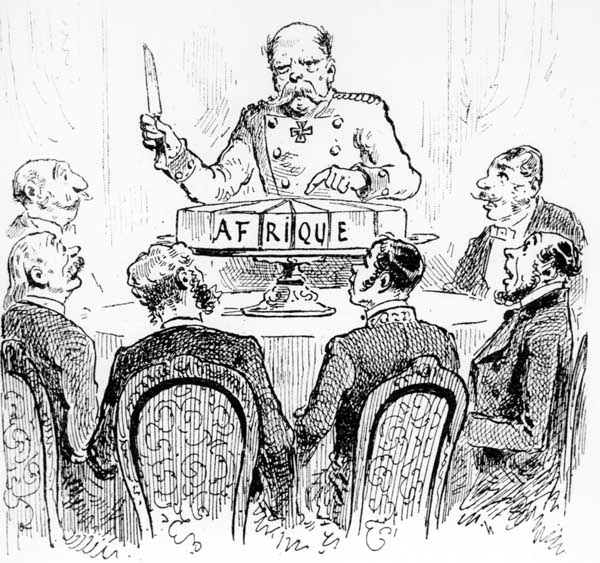The Berlin Conference and the Partition of Africa

Formalizing the Scramble for Africa

The participating countries included: Austria-Hungary, Belgium, Denmark, France, Germany, Great Britain, Italy, the Netherlands, the Ottoman Empire, Portugal, Russia, Spain, Sweden-Norway, and the United States of America. Not all of these countries had colonies in Africa, but they participated in the talks as it concerned their empires elsewhere.
Colonialism by committee
The final ruling of the Conference was the General Act, which contained many rules about how Africa was to be divided and ruled. One of the most important agreements during the conference was the use of the Congo River for free trade, allowing ships from all of the participating countries access to the Congo basin.
The partition of Africa marked an end to open war over colonial holdings, although it didn't mean the European states were friendly to one another. British troops seized control of the Ottoman territory of Egypt, which they would later declare their protectorate. Germany tried to challenge French control in West Africa, especially in Morocco.
Not all according to plan
Although all of Africa was divided at the Conference, the final map didn't look exactly as they planned. Ethiopia, under Emperor Menelik II, remained independent. When Italy attempted to conquer the country in 1895, the Ethiopians dealt them a resounding defeat at the Battle of Adwa. The Ethiopians, armed with newly purchased French and German weapons and better trained in their use, won the first Italo-Ethiopian war with fewer casualties than the Italians and with no change in their borders. By the 1930s, Ethiopia would remain the only African nation not colonized by a European country. (This doesn't count Liberia, which was a country founded by free black people fleeing conditions in the U.S.; it is important to note, however, that Liberia was also a colonial state, and the locals were not full participants in running the country).
A positive spin on imperialism
To garner public support, the conference had a stated goal of ending slavery in Africa. The Atlantic slave trade had ended decades prior, and de jure slavery was abolished in every colonial power. That was not the case in many parts of Africa, although the scope of slavery was not as extensive as it had been in the Americas. This granted them a degree of legitimacy in the public eye as they forwarded their plans to conquer the continent.
It is of course important to note that the official end of slavery on the African continent did not in any way alleviate the working conditions for African people. Aside from the long-lasting impacts of extracting resources and wealth from Africa, African people suffered violence, exploitation, and harsh legal restrictions in colonial Africa.
The Belgian Congo
The most infamous colonial holding in Africa is, probably, the Congo Free State in Central Africa. Ironically, the Congo Free State was the private property King Leopold II of Belgium; it was not a colonial territory, but one very large tract of land given to Leopold on the grounds that he would not tax trade there.
Leopold never visited the Free State, which was largely assembled by Welsh-American explorer Henry Morton Stanley on his behalf. During his rule, however, the Congo would lose nearly half of its population to war, disease, and starvation. The full scope of Leopold's death toll is hard to account for, but his administration's economic exploitation and relentless violence caused the deaths of roughly 10 million African people.
By the late 19th century, it became a popular philanthropic cause to end the brutality of the Congo Free State. Belgium officially annexed the territory from its king. However, this did not mean that much changed in the Congo. The same companies that extracted resources for Leopold now did so for Belgium, and the state itself still ran pretty much the same.







